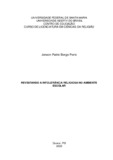| dc.contributor.advisor | Marquezan, Lorena Ines Peterini | |
| dc.creator | Porto, Jonson Patric Borge | |
| dc.date.accessioned | 2021-03-05T16:59:19Z | |
| dc.date.available | 2021-03-05T16:59:19Z | |
| dc.date.issued | 2020-12-15 | |
| dc.date.submitted | 2020 | |
| dc.identifier.uri | http://repositorio.ufsm.br/handle/1/20387 | |
| dc.description | Trabalho de conclusão de curso (graduação) - Universidade Federal de Santa Maria, Centro de Educação, RS, 2021 | por |
| dc.description.abstract | Despite being characterized by the plurality of religious beliefs, Brazil has a great Christian predominance, a characteristic that may explain the high rates of records and complaints of religious intolerance. The school emerges as an important context for the development of an education aimed at valuing differences, individuals capable of recognizing and respecting the richness of this asymmetry, whether in appearance, in customs, in beliefs, in culture or any other. The study aimed to revisit religious intolerance in the school environment. Through bibliographic research, we seek to deepen the theme, reflecting the need for education for tolerance and acceptance of religious diversity and education for peace. Within this problem, we seek to know the forms of religious intolerance in the school environment, and we seek answers to the following problem situation: what research deals with religious intolerance in the school environment? It was concluded that discrimination or religious intolerance at school makes the student feel humiliated in front of his colleagues for the simple fact of cultivating a distinct religious tradition, or simply for not cultivating any religion. This violence has a direct impact on their learning process, and may even lead to dropping out of school. At the end of the study, it is understood that further research by the teachers is necessary in the causes involving Law No. 10.639/2003, which deals with the teaching of black culture, so that teachers become agents in compliance with the Law of National Education Guidelines and Bases in favor of affirmative multicultural actions, in which the school community is the biggest beneficiary in this process. | eng |
| dc.language | por | por |
| dc.publisher | Universidade Federal de Santa Maria | por |
| dc.rights | Acesso Aberto | por |
| dc.rights | Attribution-NonCommercial-NoDerivatives 4.0 International | * |
| dc.rights.uri | http://creativecommons.org/licenses/by-nc-nd/4.0/ | * |
| dc.subject | Religious education | eng |
| dc.subject | Diversity | eng |
| dc.subject | Religious intolerance | eng |
| dc.subject | Diversidade | por |
| dc.subject | Ensino religioso | por |
| dc.subject | Intolerância religiosa | por |
| dc.title | Revisitando a intolerância religiosa no ambiente escolar | por |
| dc.title.alternative | Revisiting religious intolerance in the school environment | eng |
| dc.type | Trabalho de Conclusão de Curso de Graduação | por |
| dc.degree.local | Polo de Quaraí, RS, Brasil | por |
| dc.degree.graduation | Ciências da Religião | por |
| dc.description.resumo | Apesar de ser caracterizado pela pluralidade de crenças religiosas, o Brasil possui uma grande predominância cristã, característica que pode explicar os elevados índices de registros e denúncias de intolerâncias religiosas. A escola surge como um importante contexto de desenvolvimento de uma educação voltada para a valorização das diferenças, e, assim, formar indivíduos capazes de reconhecer e respeitar a riqueza dessas assimetrias individuais, sejam elas na aparência, nos costumes, nas crenças, na cultura ou qualquer outra. O estudo teve como objetivo revisitar a intolerância religiosa no ambiente escolar. Por meio de uma pesquisa bibliográfica, buscamos aprofundar esse tema, refletindo para a necessidade da educação para tolerância e aceitação da diversidade religiosa e a educação para a paz. Dentro desta problemática, buscamos conhecer as formas de intolerância religiosa no ambiente escolar, e buscamos respostas da seguinte situação-problema: quais as pesquisas que tratam sobre a intolerância religiosa no ambiente escolar? Concluiu-se que a discriminação ou intolerância religiosa na escola faz com que o aluno se sinta humilhado diante de seus colegas pelo simples fato de cultivar uma tradição religiosa distinta ou simplesmente por não cultivar nenhuma religião. Esta violência repercute diretamente em seu processo de aprendizado, podendo, inclusive, levar à evasão escolar. Ao final do estudo, entende-se ser necessário um maior aprofundamento por parte dos professores nas causas que envolvem a Lei nº 10.639/2003, que trata do ensino da cultura negra, de forma que os professores se tornem agentes no cumprimento da Lei de Diretrizes e Bases da Educação Nacional, em favor de ações afirmativas multiculturais, em que a comunidade escolar é a maior beneficiada nesse processo. | por |
| dc.publisher.country | Brasil | por |
| dc.publisher.initials | UFSM | por |
| dc.subject.cnpq | CNPQ::CIENCIAS HUMANAS::TEOLOGIA | por |
| dc.publisher.unidade | Centro de Educação | por |



